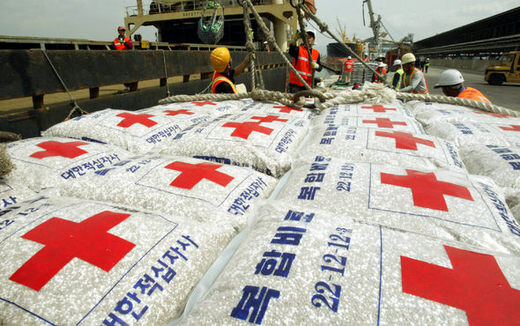hankyoreh
Links to other country sites 다른 나라 사이트 링크
South, North see thaw in relations

With relations between the two Koreas showing signs of improvement since a denuclearization deal was struck at the six-party talks on February 13, bilateral economic cooperation is also gaining momentum, spurred by the resumption of separated-family reunions and shipments of food and other humanitarian aid to the impoverished country.
During the reunions of families separated by the border between the two countries, which were held via video from March 27-29, a total of 865 members of 120 families were reunited. The event - the 5th of its kind - was supposed to take place in July last year, but it was suspended due to the North’s missile tests in July, and later by its nuclear test in October. Both Koreas decided to restart the reunions at ministerial talks earlier this month.
Amid the recent thaw in relations, South Korea sent 6,500 tons of fertilizer to the North on March 27, the first shipment of a total of 300,000 tons to be delivered this year and the first since government aid shipments were suspended in July last year, also owing to the missile test.
On March 28, Seoul sent further humanitarian aid to the North, including blankets and medication for those still suffering from the aftermath of catastrophic flooding last summer, as well as those [affected by recent epidemic outbreaks in the North, including measles and tuberculosis. More aid is slated for delivery in April and May, including 15,000 tons of rice and 70,000 tons of cement.
Officials of both countries will hold a meeting next month in Pyongyang to discuss when and how to provide 400,000 tons of rice for the North. The Unification Ministry is also considering offering 50,000 tons of corn through the U.N. World Food Programme.
Besides food aid, South and North Korea will step up cooperation in the field of energy development and light industries. Next month, they will launch a body designed to spearhead the joint projects." All preparations for the launch have been completed," Unification Minister Lee Jae-joung reported in a press conference on March 26. "We will start a committee to monitor [further] tourism projects at Mt. Geumgang, just like the committee we currently have in place for the [joint Korean] Gaesong Industrial Complex."
Such shifting inter-Korean relations, however, could become frozen again at any time, observers say. North Korea has raised its harsh rhetoric in recent days, scorning South Korea for conducting an annual joint military training drill with the United States. The nuclear issue is another stumbling block which could derail the improving inter-Korean ties. Though the North is showing signs of cooperating under the tenets of the February 13 agreement, the most recent scheduled round of six-party talks had to be suspended because Pyongyang would not come to the table, demanding that Washington effect the transfer of the North’s $25 million that was recently unfrozen at a Macau bank.
Overall, however, the mood seems optimistic. In the past, the occurence of a large-scale joint military drill between Seoul and Washington could have prompted the North to withdraw from all inter-Korean talks and cooperation projects. There was no such occurrence this time around.
This optimism was reflected by the Unification Minister Lee: "There is no problem in inter-Korean relations. The North Korean under-17 football squad has exercised in South Korea since the 20th of this month, even given the situation that the North cast harsh words on the South-U.S. joint military exercise," he said on March 28.
Please direct questions or comments to [englishhani@hani.co.kr]
Editorial・opinion
![[Column] Park Geun-hye déjà vu in Yoon Suk-yeol [Column] Park Geun-hye déjà vu in Yoon Suk-yeol](https://flexible.img.hani.co.kr/flexible/normal/500/300/imgdb/original/2024/0424/651713945113788.jpg) [Column] Park Geun-hye déjà vu in Yoon Suk-yeol
[Column] Park Geun-hye déjà vu in Yoon Suk-yeol![[Editorial] New weight of N. Korea’s nuclear threats makes dialogue all the more urgent [Editorial] New weight of N. Korea’s nuclear threats makes dialogue all the more urgent](https://flexible.img.hani.co.kr/flexible/normal/500/300/imgdb/original/2024/0424/7317139454662664.jpg) [Editorial] New weight of N. Korea’s nuclear threats makes dialogue all the more urgent
[Editorial] New weight of N. Korea’s nuclear threats makes dialogue all the more urgent- [Guest essay] The real reason Korea’s new right wants to dub Rhee a founding father
- [Column] ‘Choson’: Is it time we start referring to N. Korea in its own terms?
- [Editorial] Japan’s rewriting of history with Korea has gone too far
- [Column] The president’s questionable capacity for dialogue
- [Column] Are chaebol firms just pizza pies for families to divvy up as they please?
- [Column] Has Korea, too, crossed the Rubicon on China?
- [Correspondent’s column] In Japan’s alliance with US, echoes of its past alliances with UK
- [Editorial] Does Yoon think the Korean public is wrong?
Most viewed articles
- 1‘We must say no’: Seoul defense chief on Korean, USFK involvement in hypothetical Taiwan crisis
- 2N. Korean delegation’s trip to Iran shows how Pyongyang is leveraging ties with Moscow
- 3‘Weddingflation’ breaks the bank for Korean couples-to-be
- 4Korea sees more deaths than births for 52nd consecutive month in February
- 546% of cases of violence against women in Korea perpetrated by intimate partner, study finds
- 6Will NewJeans end up collateral damage in internal feud at K-pop juggernaut Hybe?
- 7[Column] Park Geun-hye déjà vu in Yoon Suk-yeol
- 8[Editorial] New weight of N. Korea’s nuclear threats makes dialogue all the more urgent
- 9Amnesty notes ‘erosion’ of freedom of expression in Korea in annual human rights report
- 10“Parental care contracts” increasingly common in South Korea